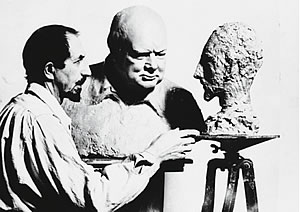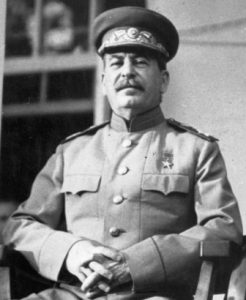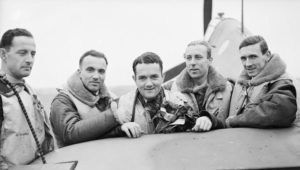1940-1942
Summer 1940 (Age 65)

Winston Churchill, Parliament Square, London © Sue Lowry & Magellan PR
March 12, 2015
Hitler issues orders (and then postpones) Operation Sea Lion, the invasion of Britain
As Churchill and all Britain waited for an imminent German invasion, Hitler was ordering that plans be prepared that would first establish German air superiority.
While inspecting the coastal defences, Churchill dined with the commander, General Montgomery. It was later said that Monty told the Prime Minister that he neither drank nor smoked and was 100% fit. To which Churchill replied, “I both drink and smoke and am 200% fit. ” In his memoirs, Montgomery called the story of Churchill’s retort an embellishment to the true version.”
The British had considerable concerns about the relationship of France to its German conquerors, most particularly the role of the French fleet. The French were presented with several alternatives, all of which denied their ships to Germany’s service. Some forces came over willingly to Britain and others were demilitarized, but at Oran, the Royal Navy was required to put the French fleet out of action by force. The attack on Britain’s erstwhile ally brought Churchill much personal sadness and anguish but he later learned that the action had convinced President Roosevelt that Britain and the Commonwealth could and would fight on.
After observing an exercise by Canadian troops, Churchill advised that they should be redeployed against the invasion rather than for their original purpose – the defence of Ireland.
The initial threat to Britain would come from the air. On 10 July the Luftwaffe made its first large-scale bombing raid. The first defence against the bombers was Fighter Command, whose commander was Sir Hugh Dowding. Although some wanted to remove Dowding, Churchill told his Air Minister, “I think he is one of the very best men you have got … he has my full confidence. “
On 16 July Hitler issued an order for “a landing operation against England”, codenamed “Sea Lion.” Churchill was also in an aggressive, offensive mood and many who met with him were reinforced in their commitment to victory. Critical to that success was aid from the United States, and Churchill made it clear that Britain was prepared “to shoot the wad” in paying for this assistance.
By the end of July underground head- quarters were prepared for Churchill and his staff at Storey’s Gate in Whitehall. Throughout the Blitz, British forces were directed from these underground Cabinet War Rooms. Strategy was greatly influenced by information gained through decoding of the German system Enigma. Because so much data was obtained through these decrypts, Churchill instructed that everything come to him edited by Major Desmond Morton.
Of great concern was the Duke of Windsor, who had been in France and was now travelling in Spain and Portugal, while being assiduously courted by the Nazis. To keep him out of enemy hands and still far from his home country he was appointed Governor of the Bahamas. While Churchill had been a strong supporter of Edward VIII, to his own political detriment, he now cautioned the Duke not to take “a view of the war, or about the Germans, or about Hitlerism, which is different from that adopted by the British nation and Parliament. “
Churchill’s relationship with King George VI and Queen Elizabeth continued to improve although, Colville noted, they were “a little ruffled by the offhand way he treats them – says he will come at six, puts it off until 6:30 by telephone, then comes at seven.”
On 14 August Churchill received a message from Roosevelt offering destroyers and aircraft in return for naval and air bases on British soil in North America, and a promise to send the British fleet to other parts of the Empire if the “waters around Britain became untenable.” Churchill readily accepted because no matter what his other problems were, he fervently believed that with United States assistance he would ultimately win.
Meanwhile the air war raged over Britain. On 20 August Churchill recognized the contributions of the young men who were daily challenging the German airforce with his comment, “Never in the field of human conflict was so much owed by so many to so few.” Later, Asquith’s daughter wrote him, “[That sentence] will live as long as words are spoken and remembered. Nothing so simple, so majestic and so true has been said in so great a moment of human history. You have beaten your old enemies ‘the Classics’ into a cocked hat! “
Greater challenges were still to come. On 24 August Germany began daylight bombing of central London and on the night of 7 September over two hundred German bombers attacked London. The next day Churchill visited the damaged streets and, according to Ismay, received responses like, “it was good of you to come, Winnie. We thought you’d come. We can take it. Give it ’em back.” He broadcast to the nation, speaking defiantly of “a people who will not flinch or weary of the struggle – hard and protracted though it will be. “
Likewise the conquered people of Europe looked to Churchill as a beacon of hope. And again he responded. “Be of good cheer, ” he broadcast to the people of Czechoslovakia. “The time of your deliverance will come. The soul of freedom is deathless; it cannot, and will not, perish.”
On 17 September, Hitler postponed Operation Sea Lion.
Subscribe
WANT MORE?
Get the Churchill Bulletin delivered to your inbox once a month.






